Module 11 Way of life. Unit 1 In China ,we open a gift later.课件(58张PPT)
文档属性
| 名称 | Module 11 Way of life. Unit 1 In China ,we open a gift later.课件(58张PPT) | 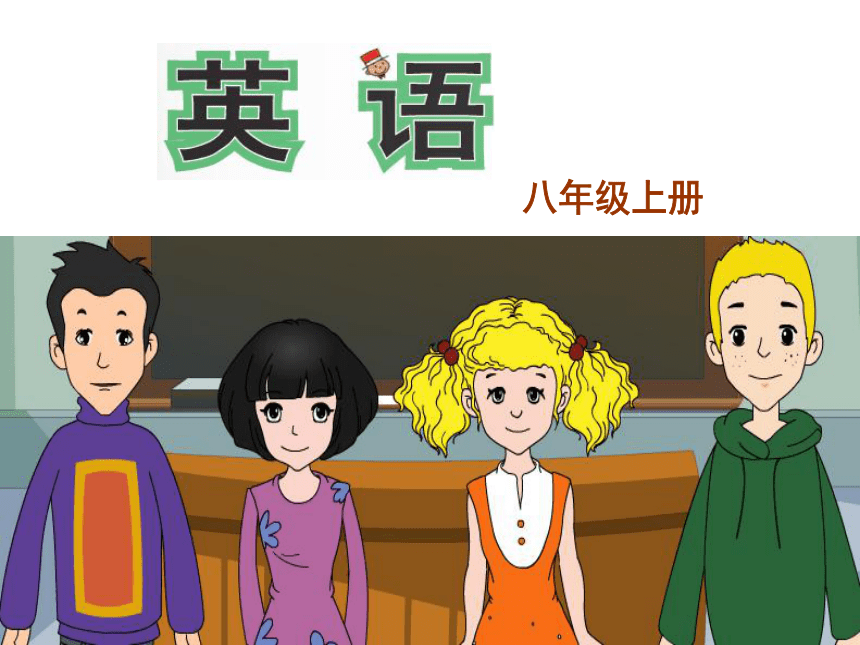 | |
| 格式 | zip | ||
| 文件大小 | 3.5MB | ||
| 资源类型 | 教案 | ||
| 版本资源 | 外研版 | ||
| 科目 | 英语 | ||
| 更新时间 | 2018-08-08 20:06:14 | ||
图片预览

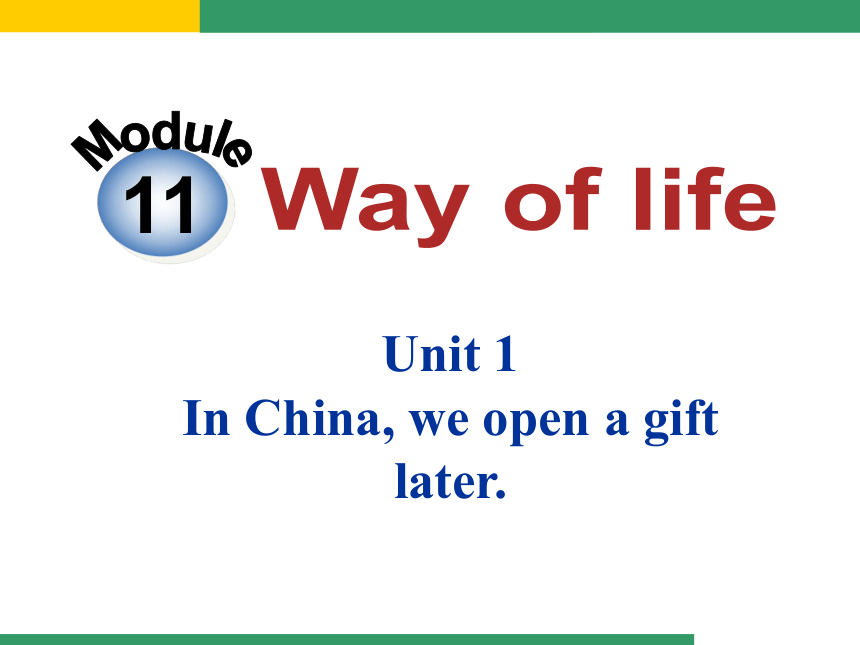
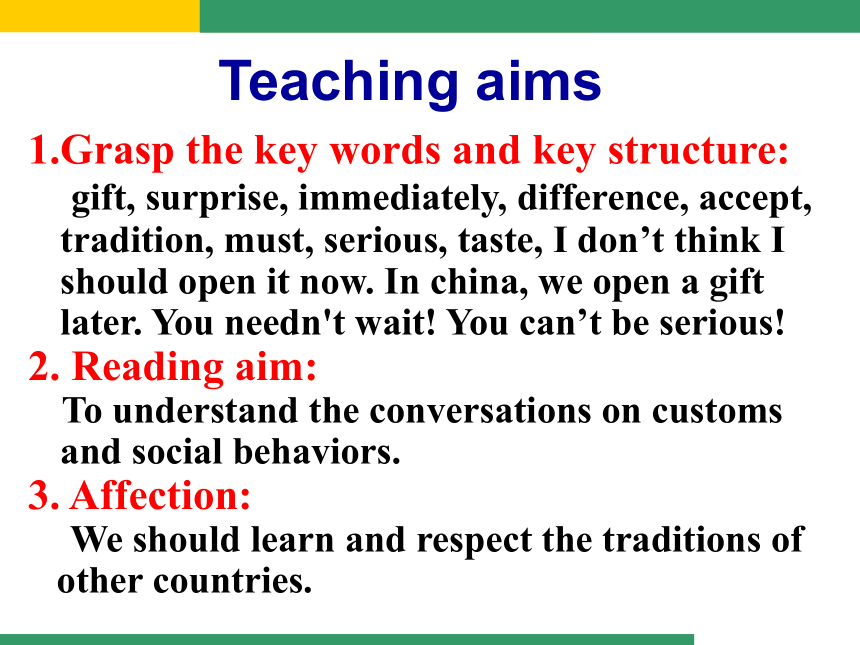
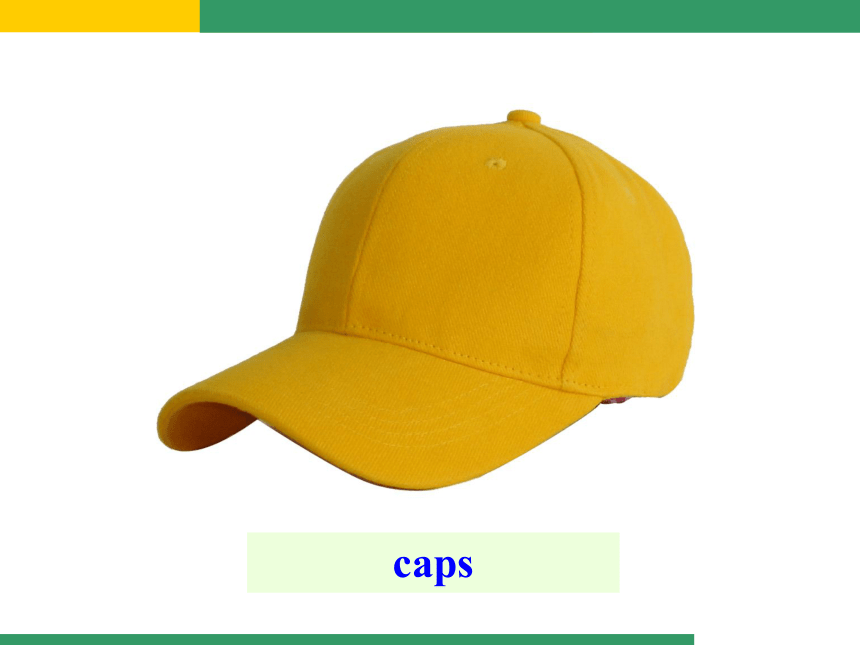

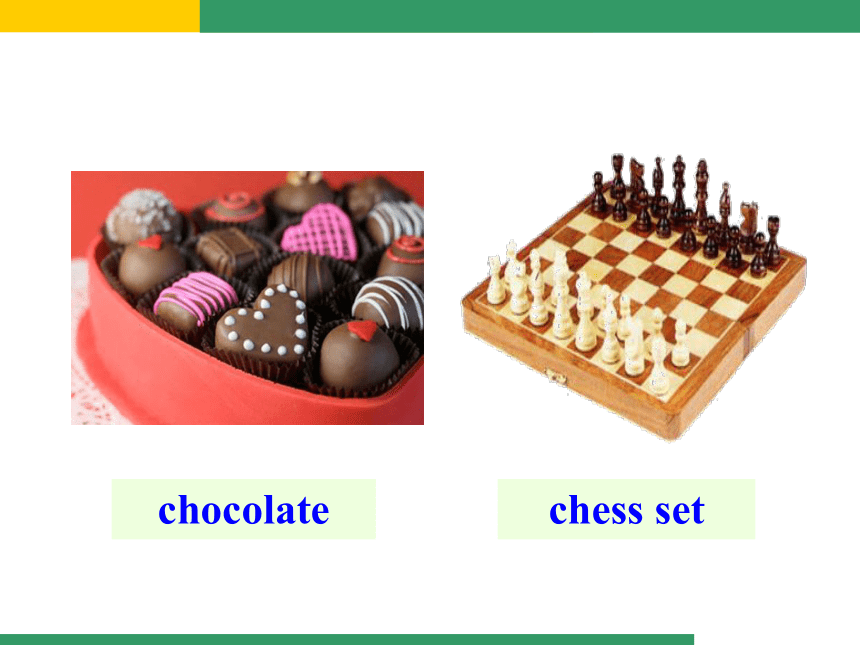
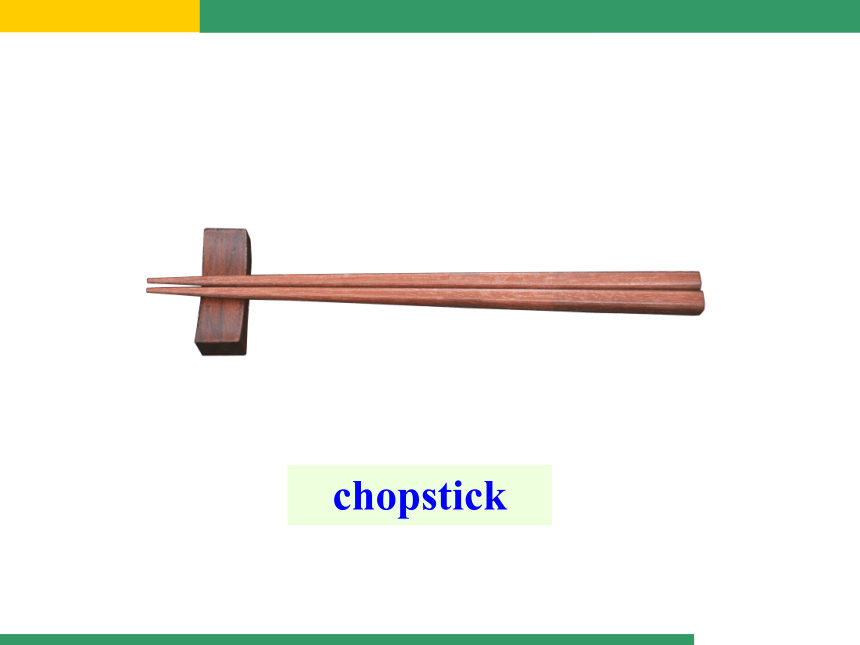
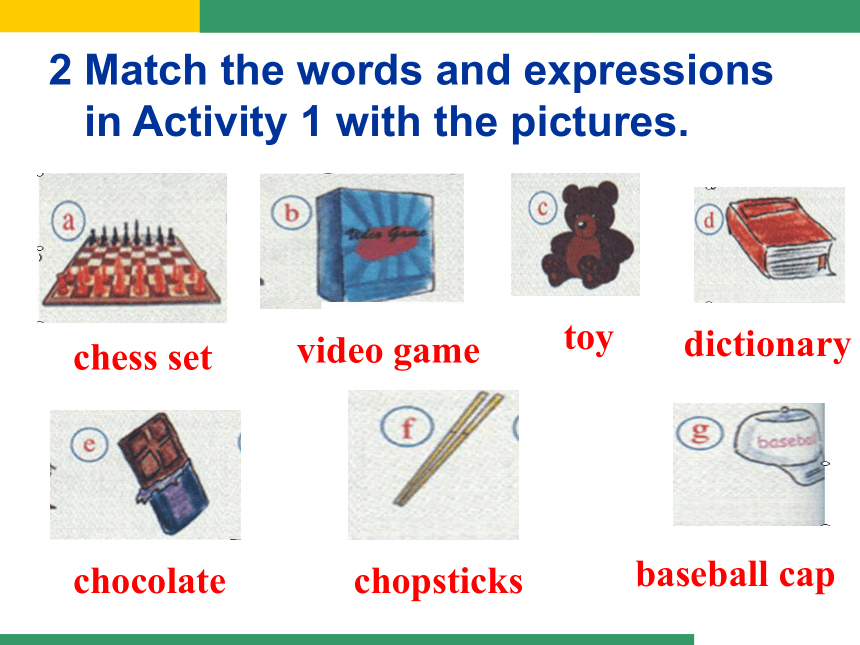
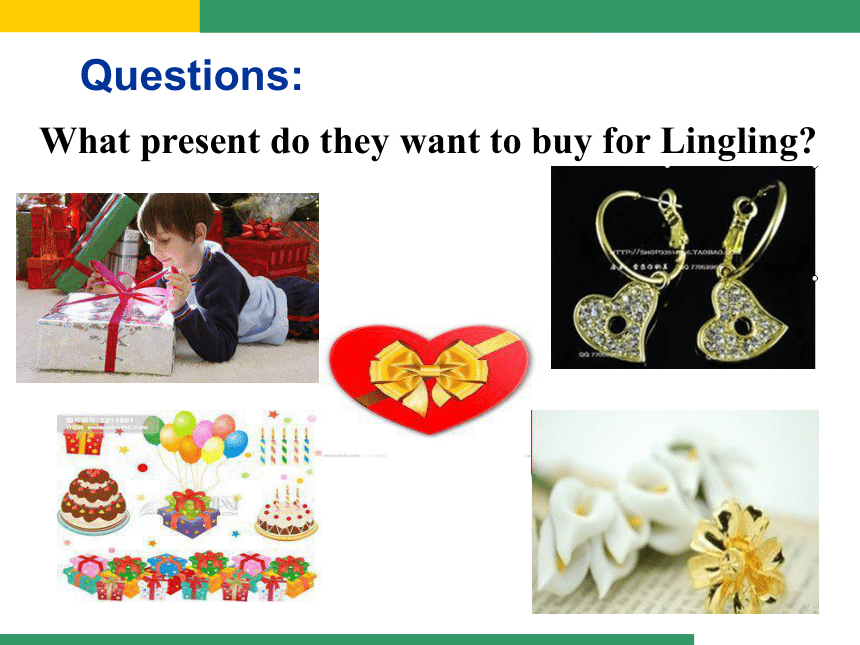
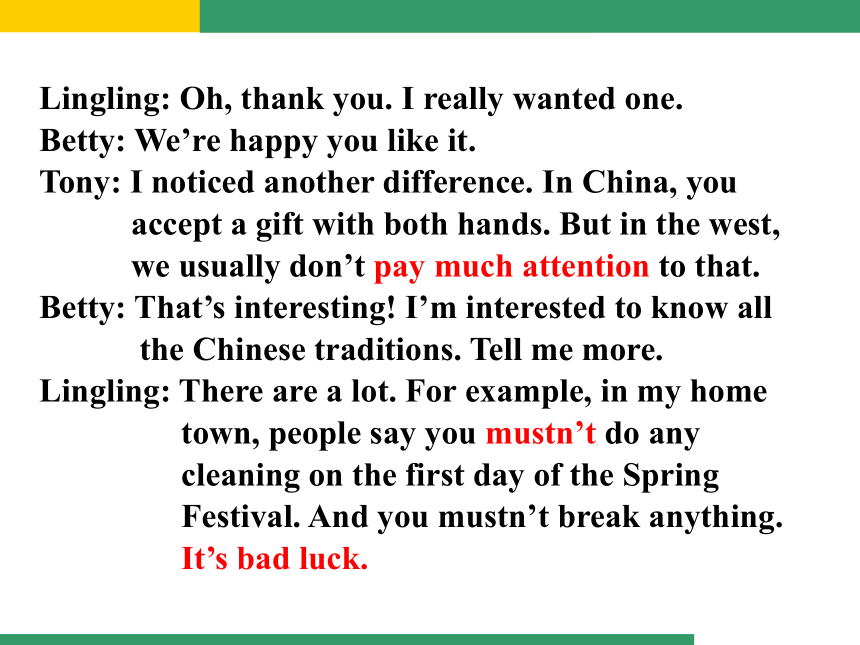
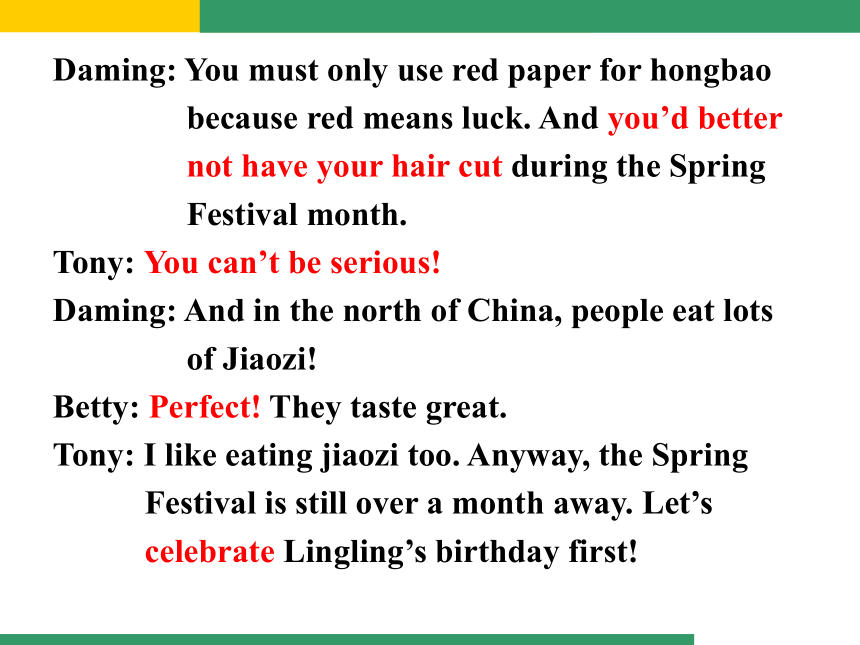
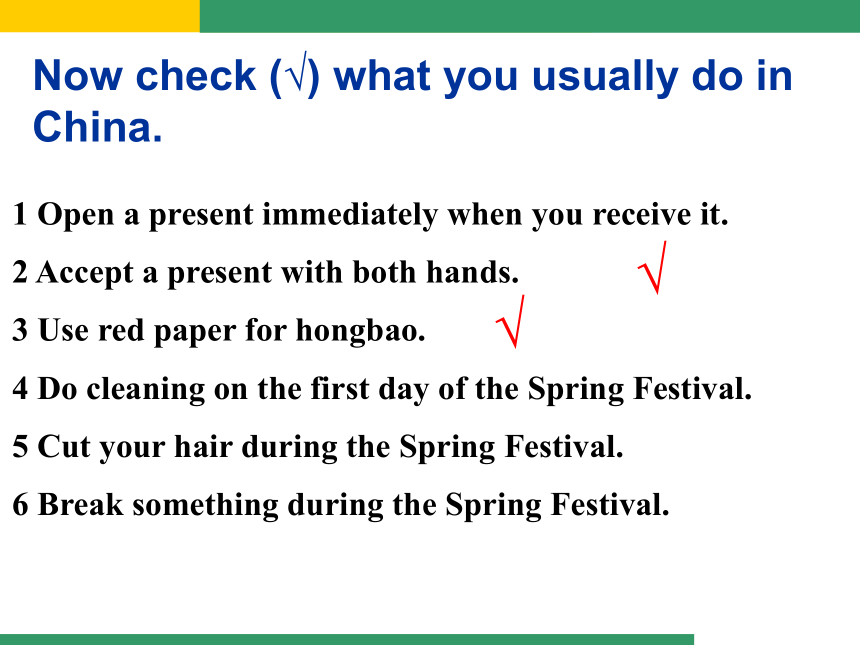
文档简介
课件58张PPT。八年级上册11Way of lifeModuleUnit 1
In China, we open a gift later.Grasp the key words and key structure:
gift, surprise, immediately, difference, accept, tradition, must, serious, taste, I don’t think I should open it now. In china, we open a gift later. You needn't wait! You can’t be serious!
2. Reading aim:
To understand the conversations on customs and social behaviors.
3. Affection:
We should learn and respect the traditions of
other countries. Teaching aimscapsdictionarychocolatechess setchopstick2 Match the words and expressions
in Activity 1 with the pictures.chess set toy baseball capvideo gamedictionarychocolate chopsticksQuestions:What present do they want to buy for Lingling?Lingling: Oh, thank you. I really wanted one.
Betty: We’re happy you like it.
Tony: I noticed another difference. In China, you
accept a gift with both hands. But in the west,
we usually don’t pay much attention to that.
Betty: That’s interesting! I’m interested to know all
the Chinese traditions. Tell me more.
Lingling: There are a lot. For example, in my home
town, people say you mustn’t do any
cleaning on the first day of the Spring
Festival. And you mustn’t break anything.
It’s bad luck.
Daming: You must only use red paper for hongbao
because red means luck. And you’d better
not have your hair cut during the Spring
Festival month.
Tony: You can’t be serious!
Daming: And in the north of China, people eat lots
of Jiaozi!
Betty: Perfect! They taste great.
Tony: I like eating jiaozi too. Anyway, the Spring
Festival is still over a month away. Let’s
celebrate Lingling’s birthday first!
Now check (√) what you usually do in
China.1 Open a present immediately when you receive it.
2 Accept a present with both hands.
3 Use red paper for hongbao.
4 Do cleaning on the first day of the Spring Festival.
5 Cut your hair during the Spring Festival.
6 Break something during the Spring Festival.
√√4 Complete the passage with the
words in the box. It is always a(n)(1) to receive gifts from
family members and friends. In China, we usually
(2) a gift with both hands and open it later.
But in the west, people usually do not pay much
(3) to that. During the Spring Festival, there
are many (4) . For example, people in the
north of China eat lots of jiaozi. They (5) great.
accept attention surprise taste traditionstraditionssurpriseacceptattentiontasteChoose the best answer for each sentence. In the USA, when someone gives you
a present, you must open it _______.
A. later B. immediately
C. five minutes
2. When you accept a present, you must use _____ in China.
A. left hand B. both hands
C. right hand3. When you accept a present, you can use
_____ in Britain.
A. both hands B. one hand C. a box
4. Hongbao in ____ paper is lucky.
A. white B. green C. red
5. You mustn’t do any ______ on the first
day of the Spring Festival.
A. shopping B. cleaning C. cookingSpeaking Read the passage and find out the sentences with can, can’t, must, mustn’t. And try to understand their meanings.5 Read and predict how the speaker will
pronounce the underlined words. 1 I don’t think I should open it now.
2 You needn’t wait.
3 You mustn’t break anything.
4 You must only use red paper for hongbao.
5 You’d better not cut your hair during the Spring
Festival month.
Now listen and check.6 Read the sentences in Activity 5 aloud.7 Think about what you must and mustn’t /
can’t do in the situations. Write notes.Now work in pairs. Say what you mustn't/ can’t do. You _____ ______ the table. ×√You _______ _____ the bowls
when you are jumping. clean washmustmustn’t用 must, mustn’t和can’t 完成句子。 You _____ ____ your clothes on Sunday. washYou _______ ____ the guitar every evening. play×√mustmustn’tYou _______ _____ the garden so dirty. makeYou _____ ____ your mother keep the garden beautiful. help×√mustmustn’tYou _____ _____ the floor with a towel (毛巾).You ____ _____ the floor with _____ (拖把). √ clean clean a mopmustcan’tGrammar Focus 情态动词
must, can need等情态动词canhad bettermustneed(能)(最好…)(需要)(必须)have to(不得不)情态动词情态动词后面 + 动词原形情态动词没有人称和数的变化1I can not play basketball. I need buy / bought a computer. 2She can / cans ride a horse. Amy need / needs buy a book.------------3否定式构成是在情态动词后面加 "not" I can play / played basketball. ---can(能)用法:① 表示能力 :He can speak a little English. Can you fly? ③ 表示请求或允许 : Can I help you? ② 表示猜测 :That can not be our English teacher,
because she has gone to Shanghai . could也可表示请求,语气委婉,主要用于疑问句,不可用于肯定句,答语应用canCould I come to see you tomorrow? Yes, you can. (否定答语可用No, I'm afraid not.) {{{注意{用法:①表示请求或允许 :May I go home,please? (1)以may(表许可或请求)开头的一般疑问句,肯定回答用may,否定回答用mustn't或can't. (2)在疑问句中不用于第二人称 ② 表示可能性 :You may be right. No, you _________ {may(可以)Yes, you may.注意might为may的过去式,但也可以代替may,
语气较为婉转客气或更加不肯定。 You might be right. mightmustn’t / you can’t.试比较 :● You may not smoke here.(不可以) 语气轻 ● You can’t smoke here.(不能)重 ● You mustn’t smoke here.(决不可)最重 can'tmay notmustn't↓用法:既可以做情态动词, 也可以做实意动词② 实意动词 (need to do sth) :① 情态动词 (need do sth) I need buy a big house. need(需要)He need drive me home. Do I need to buy a big house ? He needs to buy a big house. Need I buy a big house ? -- Yes, you must.
-- No, you needn’t / don’t have to. (不必要)-- Yes, you do. /-- No, you don’t. {{用法:② 表示推测“肯定,一定” :① 表示义务、必要或命令 : You must come early tomorrow. ---Must I finish my homework first? They must be at home. The light is on. --- Yes, you must.
--- No, you don't have to/ needn't. {must(必须)注意must开头的疑问句,其否定回答通常用 don‘t have to 或needn’t 。而不用mustn't mustn't(禁止)③ 否定时表示 “禁止” :You mustn’t smoke here. 用法:It’s eleven o’clock . I have to go now .
It was getting dark. He had to finish the work first . I don’t have to go now .
He doesn’t have to finish the work first.have to(必须)注意have to 表示客观因素
We are very glad at the party , but it’s 11 , so we have to leave now .
must 表示主观因素
We must study hard to find a good job for ourselves .must(必须)My brother was very ill, so I call the
doctor in the middle of the night.
He said that they work hard. You don't have to tell him about it. You mustn't tell him about it. 你不一定要把此事告诉他。 你一定不要把这件事告诉他 .have tomusthad tomust
区别}had better意为“最好”,表示建议和劝告,
简略式为‘d better,否定式为had better not,
后面跟动词原形。
You had better go to see a doctor.
You’d better not stay here.
had better(最好)Language points1. gift n. 礼物
something that you give to someone as a present
They like to buy a special anniversary gift for Mom and Dad.
What a wonderful gift!
However, I was not prepared for the gifts I was about to receive. 2. surprise
n. 惊奇;意外之事
an unusual or unexpected event
v. 使(某人)吃惊
to give someone a feeling of surprise
Your letter certainly came as a surprise!
I couldn't hide my surprise.
It surprised me to have such perfect peace.3. immediately adv. 立刻;当即
very quickly and without delay
I knew immediately that Miss Chen had told the truth.
The door opened immediately.4. difference n. 差别;差异
something that makes one thing or person not the same as another thing or person
This difference in temperature is caused by the sun.
We are going to look at how you can make a difference. 5. accept v. 收受;接受
to take something that someone gives you, or to say yes to an invitation or offer
I am here to accept the award on Ms King’s behalf.
Are you going to accept this first offer?
They offered me a job in the supermarket, and I accepted. 6. tradition n. 传统习俗
a very old custom, belief, or story
It was a tradition of the ancient world.
The story is based mainly on tradition.
Parents bring up their children in accordance with their own traditions.7. example n. 例子;实例
something that you mention in order to show the type of thing you are talking about and to help explain what you mean
for example 例如
used when mentioning something that shows the type of thing that you are talking about and helps to explain what you meanMany sports are still dominated by men — football is an obvious example.
For example, a modern university needs scientific instruments.8. must v.aux. 必须;应该
used for ordering someone to do or not do something, or used for saying that it is your duty to do something
I must stay here and look after my father.
Before trees are made into paper, they must be cut down.
He must wait for a few minutes.9. month n. 月;月份
one of the 12 periods that a year is divided into, such as January, February, etc.
A month later my mother was well again.
Every month I learn to do or to make something new.
The captain stayed week after week, month after month. 10. serious adj. 认真严肃的;不开玩笑的
meaning what you say or do, and not making a joke
Bob's face is very serious.
Do you think Mike is serious about going to live in New Zealand?11. taste
v. 有……的味道
to have a particular flavour
n. 味道;滋味
the flavour that something creates in your mouth when you eat or drink it
The food was dry and didn't taste very good.
The taste was very nice, like chocolate and oranges and hot sweet coffee, and very soon Alice finished the bottle.Exercises 一、单项填空。1. You have already tried your best, so
you ___ worry about the matter.
A. needn’t B. mustn’t
2. Usually he writes ___ ink and___ his
left hand.
A. in; by B. in; with
3. It’s ___.
A. a bad luck B. bad luck4. -Can you play with a yo-yo, Jim?
-Yes, I ___. It’s easy.
A. must B. can
5. -What did the head teacher say at
the meeting?
-He said, “ We ___ be proud of working
hard. We mustn’t be lazy.”
A. must B. needn’t
6. You are very ill, so you ___ stay in bed
for a week.
A. need B. must二、根据句意及首字母提示,写出相应的单词。
1. My brother is c______ happily with his
friends by QQ.
2. — Can you help me h___ up the
picture, Jack?
— No problem.
3. Jane came to see me i__________ after she
arrived in Beijing.
4. Our English teacher can’t a_____ our
invitation, because he is too busy.
5. — I passed the final exam yesterday.
— Wow, you are really a l____ dog.hattingangmmediatelyccept ucky三、根据汉语提示完成下列句子,每空一词。
1. 稍等一会儿, 我马上回来。
_____ __ a minute. I’m just coming.
2. —现在正在下大雨。我们只能呆在家里。
—倒霉。
—It’s raining heavily. We have to stay at home.
— It’s ___ ____.
3. 看!他的爸爸和妈妈来了。
Look! ____ _____ his father and mother.
4. 这仅仅是一个故事。你们不应当这么严肃吧!
This is only a story. You can’t __ ______!
5. 快点,否则你会错过末班车的。
___ _ _____ __, or you’ll miss the last bus.Hang onbad luckHere comebe seriousGet a move on1. — Could I borrow your dictionary?
— Yes, of course you _______.
A. might B. will C. can D. should
2. You ______ return the book now. You can
keep it till next week if you like.
A. can’t B. mustn’t C. needn’t D. may notC C 四、单选
3. Johnny, you ______ play with the knife, you
______ hurt yourself.
A. won’t ; can’t B. mustn’t ; may
C. shouldn’t ; must D. can’t ; shouldn’tB 4. --Will you stay for lunch?
--Sorry, _____. My brother is coming to see me.
A. I mustn’t B. I can’t
C. I needn’t D. I won’t
5. --May I pick a flower in the garden?
-- ________.
A. No, you needn’t B. Not, please.
C. No, you mustn’t D. No, you won’tB C
6. "Must I drive to his house and pick up the
children?" ?
"No, ??????? ." ? A. you shouldn't? B. you might not ?
C. you needn't ? D. you mustn'tC 7. There is someone knocking at the door. ???????
it be Tom? ? A. can? B. must? C. should? D. ought toA Homework Try to make friends with foreigners and try to
communicate with him or her about their culture.
Try to master the main grammar this unit
required.
In China, we open a gift later.Grasp the key words and key structure:
gift, surprise, immediately, difference, accept, tradition, must, serious, taste, I don’t think I should open it now. In china, we open a gift later. You needn't wait! You can’t be serious!
2. Reading aim:
To understand the conversations on customs and social behaviors.
3. Affection:
We should learn and respect the traditions of
other countries. Teaching aimscapsdictionarychocolatechess setchopstick2 Match the words and expressions
in Activity 1 with the pictures.chess set toy baseball capvideo gamedictionarychocolate chopsticksQuestions:What present do they want to buy for Lingling?Lingling: Oh, thank you. I really wanted one.
Betty: We’re happy you like it.
Tony: I noticed another difference. In China, you
accept a gift with both hands. But in the west,
we usually don’t pay much attention to that.
Betty: That’s interesting! I’m interested to know all
the Chinese traditions. Tell me more.
Lingling: There are a lot. For example, in my home
town, people say you mustn’t do any
cleaning on the first day of the Spring
Festival. And you mustn’t break anything.
It’s bad luck.
Daming: You must only use red paper for hongbao
because red means luck. And you’d better
not have your hair cut during the Spring
Festival month.
Tony: You can’t be serious!
Daming: And in the north of China, people eat lots
of Jiaozi!
Betty: Perfect! They taste great.
Tony: I like eating jiaozi too. Anyway, the Spring
Festival is still over a month away. Let’s
celebrate Lingling’s birthday first!
Now check (√) what you usually do in
China.1 Open a present immediately when you receive it.
2 Accept a present with both hands.
3 Use red paper for hongbao.
4 Do cleaning on the first day of the Spring Festival.
5 Cut your hair during the Spring Festival.
6 Break something during the Spring Festival.
√√4 Complete the passage with the
words in the box. It is always a(n)(1) to receive gifts from
family members and friends. In China, we usually
(2) a gift with both hands and open it later.
But in the west, people usually do not pay much
(3) to that. During the Spring Festival, there
are many (4) . For example, people in the
north of China eat lots of jiaozi. They (5) great.
accept attention surprise taste traditionstraditionssurpriseacceptattentiontasteChoose the best answer for each sentence. In the USA, when someone gives you
a present, you must open it _______.
A. later B. immediately
C. five minutes
2. When you accept a present, you must use _____ in China.
A. left hand B. both hands
C. right hand3. When you accept a present, you can use
_____ in Britain.
A. both hands B. one hand C. a box
4. Hongbao in ____ paper is lucky.
A. white B. green C. red
5. You mustn’t do any ______ on the first
day of the Spring Festival.
A. shopping B. cleaning C. cookingSpeaking Read the passage and find out the sentences with can, can’t, must, mustn’t. And try to understand their meanings.5 Read and predict how the speaker will
pronounce the underlined words. 1 I don’t think I should open it now.
2 You needn’t wait.
3 You mustn’t break anything.
4 You must only use red paper for hongbao.
5 You’d better not cut your hair during the Spring
Festival month.
Now listen and check.6 Read the sentences in Activity 5 aloud.7 Think about what you must and mustn’t /
can’t do in the situations. Write notes.Now work in pairs. Say what you mustn't/ can’t do. You _____ ______ the table. ×√You _______ _____ the bowls
when you are jumping. clean washmustmustn’t用 must, mustn’t和can’t 完成句子。 You _____ ____ your clothes on Sunday. washYou _______ ____ the guitar every evening. play×√mustmustn’tYou _______ _____ the garden so dirty. makeYou _____ ____ your mother keep the garden beautiful. help×√mustmustn’tYou _____ _____ the floor with a towel (毛巾).You ____ _____ the floor with _____ (拖把). √ clean clean a mopmustcan’tGrammar Focus 情态动词
must, can need等情态动词canhad bettermustneed(能)(最好…)(需要)(必须)have to(不得不)情态动词情态动词后面 + 动词原形情态动词没有人称和数的变化1I can not play basketball. I need buy / bought a computer. 2She can / cans ride a horse. Amy need / needs buy a book.------------3否定式构成是在情态动词后面加 "not" I can play / played basketball. ---can(能)用法:① 表示能力 :He can speak a little English. Can you fly? ③ 表示请求或允许 : Can I help you? ② 表示猜测 :That can not be our English teacher,
because she has gone to Shanghai . could也可表示请求,语气委婉,主要用于疑问句,不可用于肯定句,答语应用canCould I come to see you tomorrow? Yes, you can. (否定答语可用No, I'm afraid not.) {{{注意{用法:①表示请求或允许 :May I go home,please? (1)以may(表许可或请求)开头的一般疑问句,肯定回答用may,否定回答用mustn't或can't. (2)在疑问句中不用于第二人称 ② 表示可能性 :You may be right. No, you _________ {may(可以)Yes, you may.注意might为may的过去式,但也可以代替may,
语气较为婉转客气或更加不肯定。 You might be right. mightmustn’t / you can’t.试比较 :● You may not smoke here.(不可以) 语气轻 ● You can’t smoke here.(不能)重 ● You mustn’t smoke here.(决不可)最重 can'tmay notmustn't↓用法:既可以做情态动词, 也可以做实意动词② 实意动词 (need to do sth) :① 情态动词 (need do sth) I need buy a big house. need(需要)He need drive me home. Do I need to buy a big house ? He needs to buy a big house. Need I buy a big house ? -- Yes, you must.
-- No, you needn’t / don’t have to. (不必要)-- Yes, you do. /-- No, you don’t. {{用法:② 表示推测“肯定,一定” :① 表示义务、必要或命令 : You must come early tomorrow. ---Must I finish my homework first? They must be at home. The light is on. --- Yes, you must.
--- No, you don't have to/ needn't. {must(必须)注意must开头的疑问句,其否定回答通常用 don‘t have to 或needn’t 。而不用mustn't mustn't(禁止)③ 否定时表示 “禁止” :You mustn’t smoke here. 用法:It’s eleven o’clock . I have to go now .
It was getting dark. He had to finish the work first . I don’t have to go now .
He doesn’t have to finish the work first.have to(必须)注意have to 表示客观因素
We are very glad at the party , but it’s 11 , so we have to leave now .
must 表示主观因素
We must study hard to find a good job for ourselves .must(必须)My brother was very ill, so I call the
doctor in the middle of the night.
He said that they work hard. You don't have to tell him about it. You mustn't tell him about it. 你不一定要把此事告诉他。 你一定不要把这件事告诉他 .have tomusthad tomust
区别}had better意为“最好”,表示建议和劝告,
简略式为‘d better,否定式为had better not,
后面跟动词原形。
You had better go to see a doctor.
You’d better not stay here.
had better(最好)Language points1. gift n. 礼物
something that you give to someone as a present
They like to buy a special anniversary gift for Mom and Dad.
What a wonderful gift!
However, I was not prepared for the gifts I was about to receive. 2. surprise
n. 惊奇;意外之事
an unusual or unexpected event
v. 使(某人)吃惊
to give someone a feeling of surprise
Your letter certainly came as a surprise!
I couldn't hide my surprise.
It surprised me to have such perfect peace.3. immediately adv. 立刻;当即
very quickly and without delay
I knew immediately that Miss Chen had told the truth.
The door opened immediately.4. difference n. 差别;差异
something that makes one thing or person not the same as another thing or person
This difference in temperature is caused by the sun.
We are going to look at how you can make a difference. 5. accept v. 收受;接受
to take something that someone gives you, or to say yes to an invitation or offer
I am here to accept the award on Ms King’s behalf.
Are you going to accept this first offer?
They offered me a job in the supermarket, and I accepted. 6. tradition n. 传统习俗
a very old custom, belief, or story
It was a tradition of the ancient world.
The story is based mainly on tradition.
Parents bring up their children in accordance with their own traditions.7. example n. 例子;实例
something that you mention in order to show the type of thing you are talking about and to help explain what you mean
for example 例如
used when mentioning something that shows the type of thing that you are talking about and helps to explain what you meanMany sports are still dominated by men — football is an obvious example.
For example, a modern university needs scientific instruments.8. must v.aux. 必须;应该
used for ordering someone to do or not do something, or used for saying that it is your duty to do something
I must stay here and look after my father.
Before trees are made into paper, they must be cut down.
He must wait for a few minutes.9. month n. 月;月份
one of the 12 periods that a year is divided into, such as January, February, etc.
A month later my mother was well again.
Every month I learn to do or to make something new.
The captain stayed week after week, month after month. 10. serious adj. 认真严肃的;不开玩笑的
meaning what you say or do, and not making a joke
Bob's face is very serious.
Do you think Mike is serious about going to live in New Zealand?11. taste
v. 有……的味道
to have a particular flavour
n. 味道;滋味
the flavour that something creates in your mouth when you eat or drink it
The food was dry and didn't taste very good.
The taste was very nice, like chocolate and oranges and hot sweet coffee, and very soon Alice finished the bottle.Exercises 一、单项填空。1. You have already tried your best, so
you ___ worry about the matter.
A. needn’t B. mustn’t
2. Usually he writes ___ ink and___ his
left hand.
A. in; by B. in; with
3. It’s ___.
A. a bad luck B. bad luck4. -Can you play with a yo-yo, Jim?
-Yes, I ___. It’s easy.
A. must B. can
5. -What did the head teacher say at
the meeting?
-He said, “ We ___ be proud of working
hard. We mustn’t be lazy.”
A. must B. needn’t
6. You are very ill, so you ___ stay in bed
for a week.
A. need B. must二、根据句意及首字母提示,写出相应的单词。
1. My brother is c______ happily with his
friends by QQ.
2. — Can you help me h___ up the
picture, Jack?
— No problem.
3. Jane came to see me i__________ after she
arrived in Beijing.
4. Our English teacher can’t a_____ our
invitation, because he is too busy.
5. — I passed the final exam yesterday.
— Wow, you are really a l____ dog.hattingangmmediatelyccept ucky三、根据汉语提示完成下列句子,每空一词。
1. 稍等一会儿, 我马上回来。
_____ __ a minute. I’m just coming.
2. —现在正在下大雨。我们只能呆在家里。
—倒霉。
—It’s raining heavily. We have to stay at home.
— It’s ___ ____.
3. 看!他的爸爸和妈妈来了。
Look! ____ _____ his father and mother.
4. 这仅仅是一个故事。你们不应当这么严肃吧!
This is only a story. You can’t __ ______!
5. 快点,否则你会错过末班车的。
___ _ _____ __, or you’ll miss the last bus.Hang onbad luckHere comebe seriousGet a move on1. — Could I borrow your dictionary?
— Yes, of course you _______.
A. might B. will C. can D. should
2. You ______ return the book now. You can
keep it till next week if you like.
A. can’t B. mustn’t C. needn’t D. may notC C 四、单选
3. Johnny, you ______ play with the knife, you
______ hurt yourself.
A. won’t ; can’t B. mustn’t ; may
C. shouldn’t ; must D. can’t ; shouldn’tB 4. --Will you stay for lunch?
--Sorry, _____. My brother is coming to see me.
A. I mustn’t B. I can’t
C. I needn’t D. I won’t
5. --May I pick a flower in the garden?
-- ________.
A. No, you needn’t B. Not, please.
C. No, you mustn’t D. No, you won’tB C
6. "Must I drive to his house and pick up the
children?" ?
"No, ??????? ." ? A. you shouldn't? B. you might not ?
C. you needn't ? D. you mustn'tC 7. There is someone knocking at the door. ???????
it be Tom? ? A. can? B. must? C. should? D. ought toA Homework Try to make friends with foreigners and try to
communicate with him or her about their culture.
Try to master the main grammar this unit
required.
同课章节目录
- Module 1 How to learn English
- Unit 1 Let's try to speak English as much as possi
- Unit 2 You should smile at her.
- Unit 3 Language in use .
- Module 2 My home town and my country
- Unit 1 It's taller than many other buildings.
- Unit 2 Cambridge is a beautiful city in the east o
- Unit 3 Language in use .
- Module 3 Sports.
- Unit 1 Nothing is more exciting than playing tenni
- Unit 2 This year we training more carefully.
- Unit 3 Language in use .
- Module 4 Planes, ships and trains .
- Unit 1 He lives the farthest from school.
- Unit 2 What is the best way to travel.
- Unit 3 Language in use .
- Module 5 Lao She Teahouse.
- Unit 1 I wanted to see the Beijing Opera.
- Unit 2 It descibes the changes in Chinese society.
- Unit 3 Language in use .
- Module 6 Animals in danger.
- Unit 1 It allows people to get closer to them .
- Unit 2 The WWF is working hard to save them all.
- Unit 3 Language in use .
- Revision module A
- Module 7 A famous story
- Unit 1 Alice was sitting with her sister by the ri
- Unit 2 She was thinking about her cat.
- Unit 3 Language in use .
- Module 8 Accidents
- Unit 1 While the car were changing to red, a car s
- Unit 2 I was trying to pick it up when it bite me
- Unit 3 Language in use .
- Module 9 Population
- Unit 1 The population of China is about 1.37 billi
- Unit 2 Arnwick was a city with 200,000 people.
- Unit 3 Language in use .
- Module 10 The weathe
- Unit 1 It might snow.
- Unit 2 The weather is fine all year round.
- Unit 3 Language in use .
- Module 11 Way of life
- Unit 1 In China ,we open a gift later.
- Unit 2 In England, you usually drink tea with milk
- Unit 3 Language in use .
- Module 12 Help
- Unit 1 What should we do before help arrives?
- Unit 2 Stay away from windows and heavy furniture.
- Unit 3 Language in use .
- Revision module B
